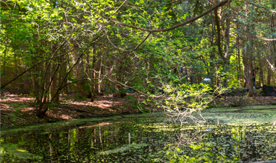Pools and People

A University of Maine wildlife ecologist will use a $1.49 million National Science Foundation grant to improve protection of small natural landscape features that significantly impact the larger ecosystem.
The four-year project, “Of Pools and People,” will inform conservation management of relatively tiny natural resources — such as vernal pools, prairie potholes and desert springs — that maintain biodiversity in urbanizing landscapes, says Aram Calhoun, professor of wetland ecology and director of the Ecology and Environmental Sciences Program.
The collaborative eight-member research team will offer insights to safeguarding these important resources, particularly on private lands. Small natural resources often can be saved while development, forestry and agriculture activities continue, Calhoun says.
Prevailing conservation strategies often do not fully utilize management opportunities, Calhoun says, sometimes because interactions among biophysical and socioeconomic components — the regulator, community and landowner decision-making — are not understood.
This project, funded by the Dynamics of Coupled Natural and Human Systems Competition (CNH) Program of the NSF, began Sept. 1.
UMaine researchers joining Calhoun on the Senator George J. Mitchell Center Sustainability Solutions Initiative (SSI) project are: Malcolm Hunter Jr., Libra professor of conservation biology; Kathleen Bell, associate professor in the School of Economics; Michael Kinnison, professor of evolutionary applications in the School of Biology and Ecology; Cynthia Loftin, associate professor in the Department of Wildlife Ecology and leader of the U.S. Geological Survey, Maine Cooperative Fish and Wildlife Research Unit; and Krista Capps, postdoctoral research fellow in sustainability science. In addition, Dana Marie Bauer, assistant professor in the Department of Earth and Environment at Boston University, and Erik Nelson, assistant professor of economics at Bowdoin College, are participating in the research.
SSI is a partnership between UMaine and other higher education institutions that seeks to produce knowledge and initiate action that addresses human needs and preserves the planet’s life-support systems.
In addition to giving stakeholders efficient and flexible management tools, researchers will share results and mentor a range of students and faculty, including those in rural and Native American schools, and integrate findings into interdisciplinary courses and citizen-science programs.
Contact: Beth Staples, 207.581.3777
